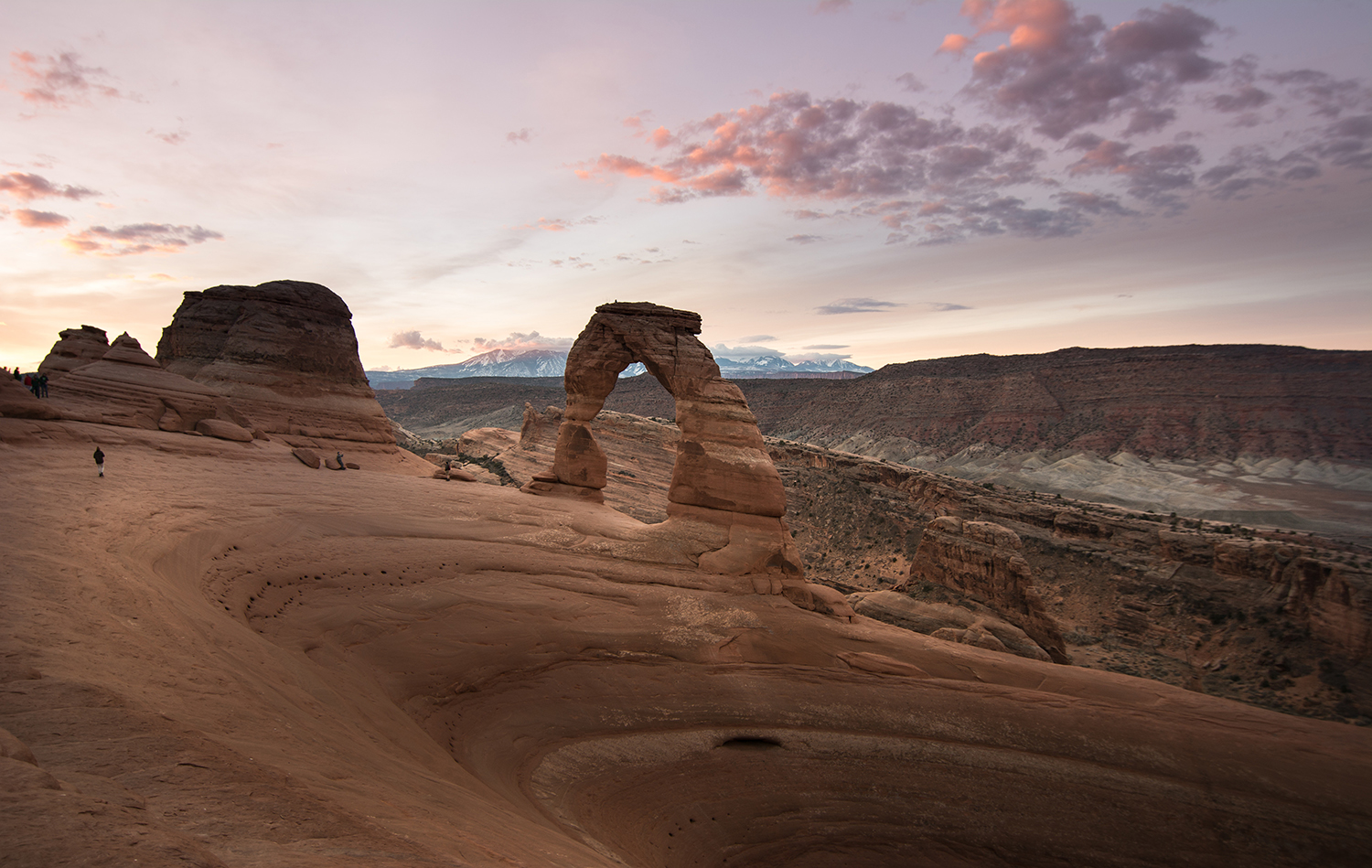
AGU Bridge Program
The AGU Bridge Program aims to support the achievement of students' educational goals in engaging graduate geoscience learning environments.
AGU Bridge Program
In alignment with AGU's mission, strategic plan, and core values, the AGU Bridge Program aims to advance opportunities for all students in graduate geoscience departments and to support cohorts of students pursuing advanced degrees in the geosciences. Talent is equally distributed, but opportunities are not. By providing support to students, the program recognizes the potential for all students to excel in the geosciences. The AGU Bridge Program is dedicated to ensuring that anyone with an interest in the geosciences has access to educational opportunities and pursuit of success in the field. The AGU Bridge Program disseminates leading practices in higher education and facilitates a graduate application pathway in partnership with geoscience graduate departments across the U.S. To address today’s global challenges, we need a scientific community that is engaging for all students who are interested in pursuing advanced degrees in the geosciences.
As part of our commitment to expanding opportunities for all students in the geosciences , we expect our partner departments to:
- Participate in collaborative discussions with other partner departments and the AGU Bridge Program on practices that improve all programs
- Engage faculty/staff/students both internally and externally in discussions and actions that improve the access to and experience of graduate education for all students
- Work with AGU Bridge program to track student progress and submit progress reports (Grades, GPA, and transcripts are not collected)
- Submit annual impact reports
The program is open to those who have not applied to graduate school or applicants who applied to one or more geoscience graduate programs but did not accept an offer or commit to a specific department/program in the current academic year. See the student benefits and eligibility tab for additional eligibility requirements.
Now accepting AGU Bridge partner proposals!
Interested departments should visit the “Partner Benefits & Application” tab for details. 2025 AGU Bridge Partner application deadline is 10 September 2025.
RFP detailsAGU Bridge Program Partner Institutions
The AGU Bridge Program is an asset to geoscience departments seeking to promote opportunities for all and support of students within their graduate programs and within the larger geoscience community. By working together, we can create a more welcoming environment in the geosciences for everyone.
Congratulations to the department selected for partnership in 2024: University of Massachusetts Lowell, Department of Environmental, Earth, and Atmospheric Sciences.
Our newest partner will join the existing cohort of 50 partner departments selected for partnership beginning in 2019.
See our interactive map displaying all current AGU Bridge Program partners here! The map contains basic information about each partner department as well as links to each department website, and ways to filter through partner departments.

AGU Bridge Program Partner Benefits
Access to the AGU Bridge Program student applicant database.
Recognition by AGU of the department’s commitment to a supportive future in the geosciences.
Recommendation of the department’s supportive post-baccalaureate educational environment to prospective and current Bridge Program students.
Secure a five-year partnership with the potential to renew.
In addition to the benefits listed above, Bridge Program Partners will also receive access to AGU Bridge Program staff, veteran Bridge Program Partners, and other subject matter experts to provide resources and strategies for supporting their students.
Application for Bridge Program Partner
When departments are accepted as an AGU Bridge Program Partner, they are committing to building and maintaining a supportive community within their department and our larger geosciences community thereby expanding opportunities within the geosciences. By working together, we will create a more welcoming environment in the geosciences for everyone.
The application is free. Applicants must be U.S. based institutions that grant a master’s or doctoral degree in geosciences.
AGU Bridge partner proposals are reviewed annually. Please refer to the current request for proposal instructions ![]() . Partnership Departments Request for Proposals for the 2025 AGU Bridge Program Cycle are due by 11:59pm ET on 10 September 2025. Applications must be submitted via online submission portal, found here.
For additional instruction on how to submit your application, download the "Instructional Guide: AGU Bridge Partner RFP submission platform" document
. Partnership Departments Request for Proposals for the 2025 AGU Bridge Program Cycle are due by 11:59pm ET on 10 September 2025. Applications must be submitted via online submission portal, found here.
For additional instruction on how to submit your application, download the "Instructional Guide: AGU Bridge Partner RFP submission platform" document ![]() .
.
Review the attached Bridge Program Dos and Don’ts ![]() for tips on how to submit a successful AGU Bridge partner proposal.
for tips on how to submit a successful AGU Bridge partner proposal.
Please reach out to Bridge Program staff at [email protected] with any questions.
How are Bridge partners selected?
Motivation
Departments are asked to provide their motivation for seeking to become an AGU Bridge partner and how they will commit to helping create more opportunities and a supportive future within the geosciences.
Department Data
We request department acceptance rates, retention rates, and program size.
Admission Practices
- We look for evidence of multi-faceted admission criteria and an admission process that examines a broad range of student potential to conduct original research without employing strict GRE cutoff measures.
- We expect departments to provide clear information about funding packages and additional financial resources for students.
Expanding Opportunity Efforts
In our review, we look for active departmental efforts to expand opportunities for all students in a supportive environment. This looks different for each partner department.
Faculty Engagement
We seek engaged and committed faculty in our partner departments. Departments must describe how they will directly contribute to and mentors students who enter the department via the AGU Bridge Program.
Mentoring Activities
Mentoring is a vital part of graduate school, and we seek departments that are prepared to mentor students effectively. This can include training for mentors, previous successes mentoring students, and mentor-mentee compacts.
Advising & Induction Practices
We look for evidence that departments possess student handbooks, IDP’s and other induction and advising resources.
Progress Monitoring
A transparent and effective process for progress monitoring is an important component of student success in graduate programs. We look for evidence of how students are monitored and plans for early intervention, clear timelines for student milestones, and procedures for how grievances are handled. We also look at exam structures and exam pass rates.
Information for interested applicants
Interested in applying to graduate school in the geosciences? Apply through the AGU Bridge Program!
The AGU Bridge Program is cultivating a broad community of future geoscience graduates by supporting students to excel in their academic pursuits. Our partners are committed to adopting best practices in admissions and retention of students and are striving to improve the geoscience education experience for all students. Interested applicants can apply using a single, free application to be considered for graduate school admission by our 45+ partner geoscience departments.
AGU Bridge Program partner departments review AGU Bridge applications each spring and may extend offers of admission to their graduate programs to interested applicants. Students who choose to enroll in graduate school via the AGU Bridge Program are automatically enrolled as program participants with AGU. Offers of admission are not guaranteed and interested applicants should review the various eligibility criteria of some of our partner programs to understand which advanced undergraduate coursework may be required. This may include courses in advanced calculus, math, or other related geoscience coursework. Students without an undergraduate degree in the geosciences should use the application to speak to how their studies have prepared them to successfully pursue a graduate degree in the geosciences.
Eligibility requirements
The Bridge Program application is open to applicants who did not apply to a geoscience graduate program, or, applicants who applied to one or more geoscience graduate programs, but did not accept an offer or commit to a specific department/program in the current academic year. If applicants are waiting to be notified about acceptance into a graduate school program, they should still apply for the AGU Bridge Program.
Successful applicants to the AGU Bridge Program must meet the following criteria:
Attain a bachelor’s or master’s degree in geoscience or a closely related discipline by the time they would enter the AGU Bridge Program.
Satisfy additional requirements of individual Bridge Program departments. Departments have different requirements and applicants may be asked to submit additional materials if admitted to programs that require them. Applicants are encouraged to ask departments about any additional requirements during the interview/contact period in the spring.
Be a U.S. citizen, permanent U.S. resident cardholder, or have current enrollment in the DACA program.

Frequently Asked Questions
Are students that have already attained a master's degree still eligible to apply to the AGU Bridge Program?
Yes, you are eligible to apply for the AGU Bridge Program even if you have already attained a master’s degree. The eligibility requirements state that applicants have obtained a bachelor’s or master’s degree in geoscience or a closely related discipline by the time they would enter the AGU Bridge Program. Note that students who have already attained a master’s degree in the geosciences must meet all other eligibility requirements, including not accepting an offer or committing to a specific department/program in the current academic year.
Do students receive stipends if accepted into a program and if so, in what amount?
The AGU Bridge Program does not presently offer funding to successful applicants nor to participating institutions, however, these institutions typically offer financial support, typically comparable or identical to stipends received by other graduate students at the institution. Once students receive graduate program offers, students should consider whether the offered financial support is sufficient for their needs.
What are some potential career paths I can pursue with a graduate degree in the geosciences?
A graduate degree in the geosciences opens the door to a number of potential career paths! While some students may continue a career in academia, most graduates will go on to careers outside of academia spanning a diverse array of fields including careers in industry, government, and non-profit organizations. For more information on geoscience careers outside academia, explore the resources from this link: https://www.grow-geocareers.com/
Learn more about mentoring and best practices for expanding student opportunities and experiences in the geosciences and how you can get involved.
General Resources
- AGU Ethics & Equity Center curates and shares resources, including workshops and trainings, for cultivating a supportive scientific community in the Earth and space sciences.
- National Association of Geoscience Teachers Resources Resources from NAGT include a compiled list of organizations, guides, reading materials, and various media about best practices in higher education.
Geosciences Data, Statistics, and Reports
Data & Statistics
- Geoscience Numbers, Equity in Graduate Education (a collaboration between IGEN and the California Consortium for Inclusive Doctoral Education (CCIDE) project) gathered data regarding the representation of historically marginalized students in the Geosciences (Numbers, Data on general STEM)
- Status of the Geoscience Workforce from the American Geosciences Institute, shows demographic data in the geosciences from higher education to the workforce
Reports and Articles
- No progress on diversity in 40 years Bernard, R.E., Cooperdock, E.H.G, a published paper on demographics and diversity in geoscience doctorate programs over the last 40 years
- Race and racism in the geosciences a published article in Nature from Kuheli Dutt on racism, bias, and individual responsibility
- Moving Beyond the Business Case for Diversity EOS article by Rebecca Haacker, Melissa Burt and Marissa Vara on reframing equity for equity and individual sake instead business and productivity
- Diversity, Equity, and Inclusion in the Earth and Space Sciences. Special issue of AGU Advances including multiple published papers on trends, climate, call to actions, and best practices/guides
Where to Start
How Departments & Institutions Can Get Started
- FAQ of Doctoral Education from IGEN Research Hub, contains quick information on diversity in science, best admission practices, and impacts of the Bridge programs
- An actionable anti-racism plan for geoscience organizations by Ali, H.N., Sheffield, S.L., Bauer, J.E. et al. On systemic racism in the geosciences and how to combat it.
- To GRE or not to GRE: FAQ questions, answers, and cited sources on using the GRE in graduate school admissions. Also read GRE in Geosciences Nature articles - discusses current perspectives in the geosciences - and #GeoGRExit EOS article on why programs are dropping the GRE
- Highlighting altruism in geoscience careers aligns with diverse US student ideals better than emphasizing working outdoors published article from Carter, S.C., Griffith, E.M., Jorgensen, T.A. et al. on reframing to increase diverse recruitment and interest in the geosciences
- Fisk-Vanderbilt Master’s-to-PhD Bridge Program Toolkit compiled their lessons learned, strategies, and tools to inspire and provide concrete guidance for other practitioners in the field seeking to develop similar programs. To access these resources, you must fill out their form.
Mentoring Centers
- Mentoring365 is a safe virtual mentoring platform for those interested in the Earth and space sciences (ESS) community. You can become a mentor or mentee, no matter your expertise, interest or location, and connect with others to help with career search, skills, exploration, and navigation. (Mentors/Mentees)
- Center for the Improvement of Mentored Experiences in Research (CIMER) (IGEN partner) develops, implements and studies evidence-based and culturally aware trainings, facilitations and communities for research mentoring relationships. (Mentors)
- The Science of Effective Mentorship in STEMM Online Guide from National Academy Of Sciences with resources, tips, and tools on effective mentorship (Mentors)
Student & Faculty Relationships
- Equitable Practices For Writing, Reading, And Soliciting Letters Of Recommendation, a guide from Equity in Graduate Education University of Southern California (Mentors/Mentees)
- Writing Reference Letters for People With Disabilities, authored by Michelle Cooke, University of Massachusetts Amherst, AGU Bridge Partner department (Mentors/Mentees)
- Resources for Supporting Graduate Student Wellbeing, from IGEN Research Hub, a curated list of mental health and wellness resources (Mentees/Mentors)
Best Practices for Faculty
- Toilet stops in the field: An educational primer and recommended best practices for field-based teaching published article from University of Birmingham Earth Sciences Department professors, for more Field-based teaching tips check out Ten Steps to Protect BIPOC Scholars in the Field - Eos By J. Anadu, H. Ali and C. Jackson
- Ten simple rules for building an antiracist lab published article from Chaudhary VB, Berhe AA, who further discuss this in Building Antiracist Spaces in Your Department a free online webinar from AGU Heads and Chairs program and the American Geosciences Institute
Organizations and Groups in the Geosciences
Learn about some of the affinity groups in geosciences. Click on the links to get involved and learn more.
- 500 Queer Scientists
- 500 Women Scientists
- American Indian Science and Engineering Society (AISES)
- Asian Americans and Pacific Islanders in Geosciences (AAPIiG)
- Association for Women Geoscientists (AWG)
- Black In Geoscience (BiG)
- Black in Marine Sciences (BiMS)
- Black Women in Ecology, Evolution and Marine Sciences (BWEEMS)
- Earth Science Women's Network (ESWN)
- GeoLatinas
- Geoscience Alliance (GA)
- Minorities Striving and Pursuing Higher Degrees of Success in Earth System Science (MS PHD’S®)
- National Association for Black Geoscientists (NABG)
- National Organization of Gay and Lesbian Scientists and Technical Professionals (NOGLSTP)
- Society for Advancement of Chicanos/Hispanics & Native Americans in Science (SACNAS)
- Society Of Latinos/Hispanics in Earth and Space Science (SOLESS)
- Society of Exploration Geophysists (SEG) Women’s Network (SEGWN)
- Women of color and non-binary people of color in ecology, evolutionary biology, and allied fields (WOCinEEB)


